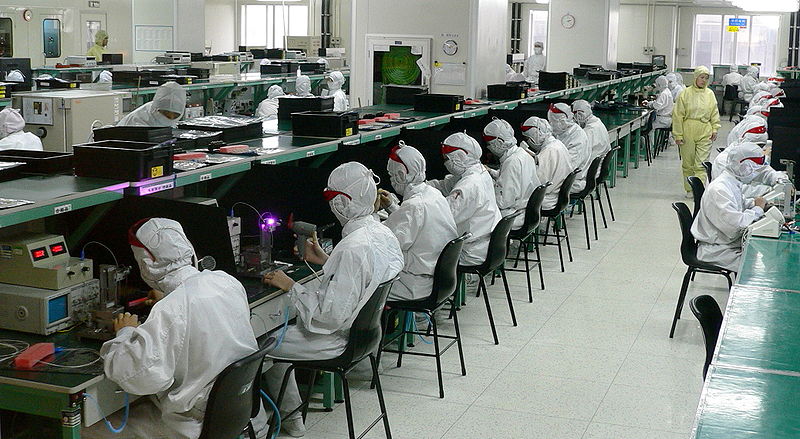Foxconn has apologised after workers at its troubled Zhengzhou iPhone factory in China clashed with riot police earlier this week.
Footage uploaded to social media on Wednesday showed hundreds of workers joining protests at the world’s largest iPhone plant in China, with some men smashing surveillance cameras and windows.
Some workers were apparently beaten by Chinese riot police and there were some reported injuries as well.

Foxconn apology
The trigger for the protests appeared to be a plan to delay bonus payments for new workers, and many of the demonstrators were reportedly chanting “give us our pay!”.
Some workers also complained they were forced to share dormitories with colleagues who had tested positive for Covid-19.
Foxconn on Wednesday was quoted by Reuters as saying it had fulfilled its payment contracts and that reports of infected staff living on campus with new recruits were “untrue.”
On Thursday however, Reuters reported Foxconn as saying that a pay-related “technical error” had occurred when hiring new recruits, and the Taiwanese manufacturing apologised to workers after the labour unrest.
“Our team has been looking into the matter and discovered a technical error occurred during the onboarding process,” Foxconn was quoted as saying in a statement, referring to the hiring of new workers.
“We apologise for an input error in the computer system and guarantee that the actual pay is the same as agreed and the official recruitment posters.”
Foxconn did not elaborate on the error.
The apology was an about-face from a day earlier when Foxconn said it had fulfilled its payment contracts.
However it seem that the admission has resulted in the largest protests dying down and the company was communicating with employees engaged in smaller protests, a Foxconn source familiar with the matter told Reuters on Thursday.
Apple said it had staff at the factory and was “working closely with Foxconn to ensure their employees’ concerns are addressed.”
Factory lockdown
The unrest comes at a time as China witnesses record numbers of Covid-19 infections and is grappling with more and more lockdowns.
And one of the lockdowns has impacted the availability of high-end models of the iPhone 14.
Earlier this week Best Buy CEO Corie Barry said that Apple’s high-end iPhones like the iPhone 14 Pro will be in short supply at stores this holiday season.
Earlier this month, Foxconn’s Zhengzhou factory – sometimes referred to as “iPhone City” – was placed in a seven day lockdown.
Normally the Zhengzhou plant, which is spread over 1.4 million square metres and boasts dormitories, restaurants, basketball courts and a football pitch, employs 200,000 workers, who produce a staggering 500,000 iPhones a day.
Chinese authorities took the decision to lockdown the whole area after Foxconn had tried to control a Covid outbreak at the world’s largest iPhone factory in October and early November.
However before the lockdown kicked in, local reports suggested that significant numbers of factory workers at the Zhengzhou plant had fled the site, as Coronavirus cases rose, due to fears of lockdowns or Covid-19 outbreaks.
That lockdown itself lasted until Wednesday 9 November, and it did not appear to stop cases spreading however, with infections identified in October and November.
Manufacturing issue
With the lockdown now over at the facility, production is still down due to a lack of staff (a lot of whom had fled).
Capacity at the factory, which is currently operating in a so-called closed loop operation, could be down by as much as 30 percent this month, it has been reported in media outlets.
Foxconn previously said it will do everything it possibly can to fulfil its order book, and last week Chinese officials reportedly began drafting in retired members of the military and government to help at the factory.
Officials have been accused of “performative lockdown lifting” amid reports people’s freedoms were still restricted inside the plant, in order to isolate the factory workers from the surrounding region.
Apple also took the highly unusual step of warning customers of longer wait times for new iPhones as the lockdown affected shipments of the latest generation of the device.
The Zhengzhou factory is critical to Apple, as the plant makes the iPhone 14 Pro and Pro Max, and accounts for 70 percent of iPhone shipments globally.
Apple has recently begun shifting some iPhone 14 production to factories in India.




